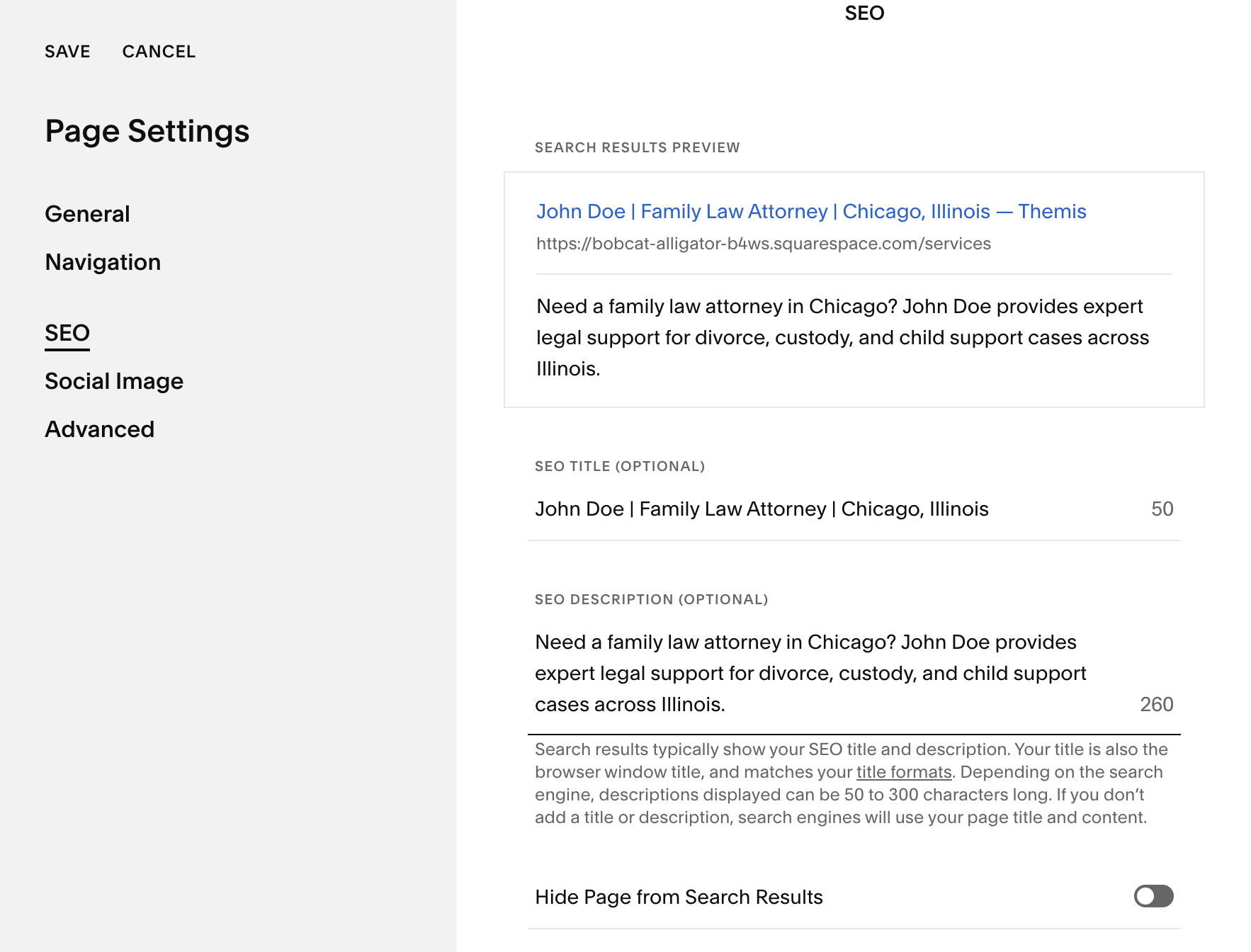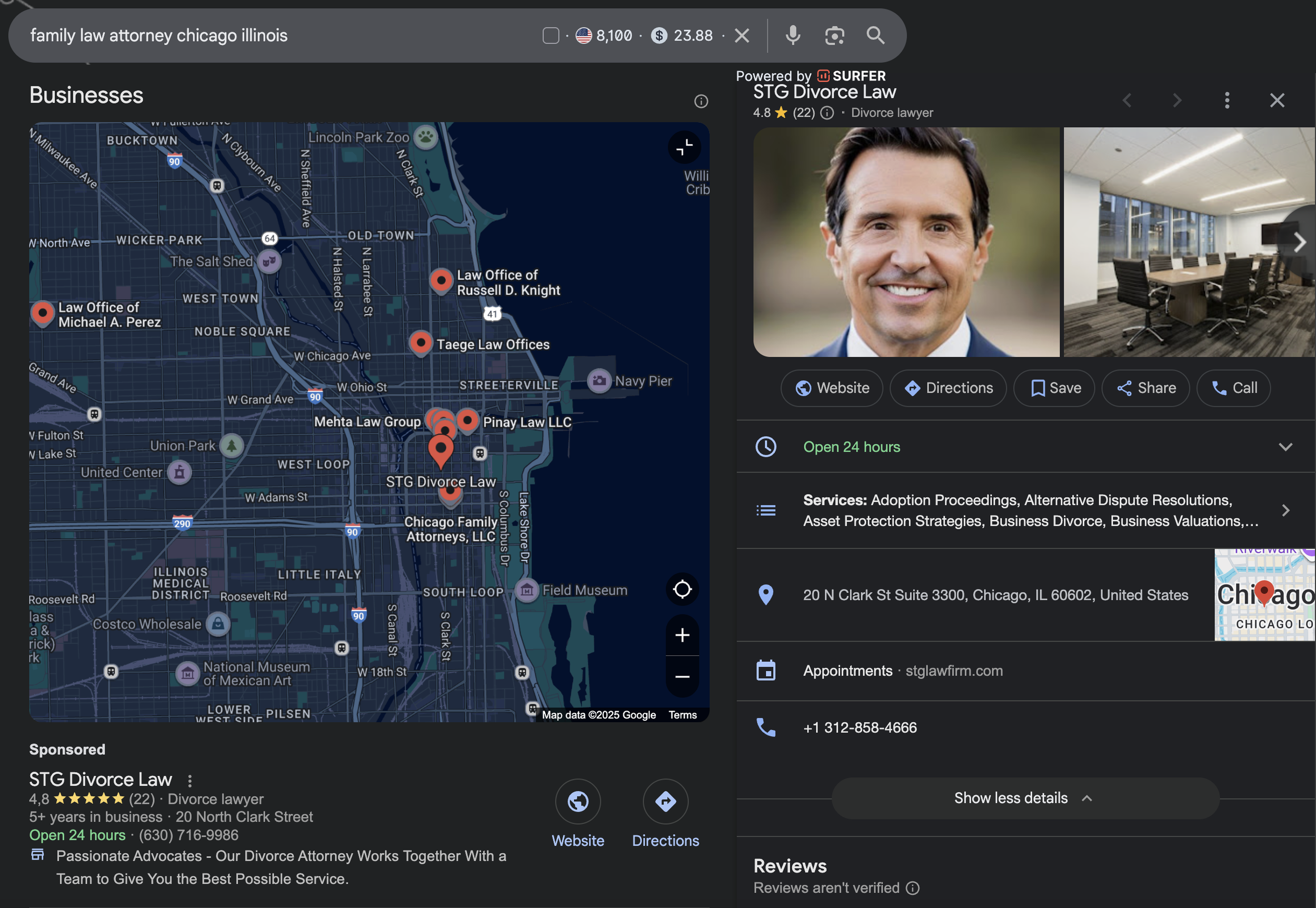SEO for Law Firm Websites: 6 High-Impact Fixes That Actually Bring Clients
In most countries, law firms can’t rely on traditional advertising — and even where it’s allowed, it often feels unprofessional or overly promotional.
That’s why so many legal practices still depend on word of mouth to attract new clients.
But here’s the problem: referrals take time.
Meanwhile, there are hot leads searching right now — people typing “divorce lawyer near me” or “business contract attorney in [city]” — ready to hire someone today.
This is where SEO for law firm websites changes everything.
When your site is clear, structured, and optimized for how people actually search, you can show up for those clients — ethically, organically, and consistently.
You don’t need to compete with giant agencies or spend months blogging.
You just need to fix a few foundational things most lawyers overlook — and let Google do the rest.
Here are five practical, high-impact SEO fixes that help your law firm website attract the right clients, faster.
Fix Your Titles and Meta Descriptions
Your page titles and meta descriptions are the first impression Google — and your future clients — see.
If your homepage title just says “Home” or “Smith Legal Group”, you’re wasting prime SEO real estate.
Instead, use this structure:
[Service] + [Location] | [Law Firm Name]
✅ Family Lawyer in Toronto | Smith Legal Group
✅ Divorce Mediation & Custody Agreements | Harmony Legal
Then write a short meta description that includes your service and location, e.g.:
“Smith Legal Group provides family law and mediation services across Toronto. We help clients resolve divorce and custody matters with clarity and care.”
Google bolds matching keywords in results — which can double your click-through rate.
2. Create a Separate Page for Each Practice Area
One of the most common law firm SEO mistakes is having all services lumped together on one page called “Practice Areas.”
That structure confuses Google — and clients.
Each service (e.g., family law, real estate, business law) deserves its own dedicated page with a descriptive title, summary paragraph, and contact CTA targeting a location-specific keyword.
This gives you multiple entry points into search, such as:
Family Lawyer in Chicago
Business Contract Attorney Illinois
Real Estate Lawyer Near Me
💡 On Squarespace, use the page title and URL slug strategically — for example:
/family-law-toronto or /estate-planning-chicago
3. Add Location Signals Everywhere
If you serve clients in a specific area, Google needs to see it — consistently.
Include your city and region in:
Your footer (with full address)
Page titles and headings
Image ALT text (e.g., “Toronto family law office”)
Embedded Google Map
Google Business Profile (we’ll get to that next)
This builds what’s called local relevance — one of the strongest ranking signals for law firms.
Bonus: If you work remotely but serve specific regions, list them clearly on your “Contact” or “Areas Served” page.
Themis, my Law Firm Squarespace Template includes a map
4. Use Testimonials and Trust Signals
Law is a trust-based industry — people choose firms that feel credible and human.
Adding authentic testimonials, media features, numbers, and credentials can help your site rank and convert.
Why? Because Google tracks engagement. When visitors stay longer and interact with your site (reading reviews, clicking bios), your SEO performance improves naturally.
Make sure every testimonial includes:
The client’s first name or initials
Case type (if public)
A short, specific outcome (e.g., “Helped me finalize my custody agreement smoothly.”)
5. Publish Answers to Real Client Questions
Your future clients are typing questions into Google every day.
That’s free keyword data.
Use those questions as blog posts or FAQ sections:
“How much does divorce mediation cost?”
“Do I need a lawyer to buy a house in Illinois?”
“What happens if a will isn’t notarized?”
These long-tail keywords attract searchers at the exact moment they’re looking for legal help.
You don’t have to publish weekly — even one or two strong, evergreen posts per month can make a big difference.
For FAQ sections, make sure you add FAQ schema (structured data). You will find more information about Squarespace and schema here.
6. Optimize Your Google Business Profile (Your #1 Local SEO Tool)
If you serve clients in person or regionally, your Google Business Profile (formerly Google My Business) is just as powerful as your website.
It’s often the first thing clients click before they even visit your homepage.
Here’s how to optimize it for maximum visibility:
1. Write a Clear, Keyword-Rich Title
Include your service and city:
✅ Smith Legal Group – Family Lawyer in Chicago
❌ Smith Legal Group
Google uses this to understand what you do and where you’re located.
2. Craft a Compelling Description
Use natural, client-focused language:
“Smith Legal Group provides family law and mediation services in Chicago. We help clients navigate divorce, custody, and co-parenting with clarity and care.”
Include your practice areas and city once or twice — that’s all you need.
3. List Your Services as Products (with Local Keywords)
This is one of the most overlooked tricks.
Instead of just listing “Services,” add each one under “Products,” with a title, image, and short description:
Divorce Mediation – Family Lawyer in Chicago
Estate Planning – Legal Services in Illinois
Business Contracts – Startup Attorney Chicago
Each product acts as a micro-page, helping you rank for those keywords.
4. Add Authentic Photos
Skip the stock gavels and handshakes.
Post real photos — your team, your office, your branding.
Google prioritizes listings that look active and genuine.
5. Post Updates Regularly
Treat Google Posts like micro-blog updates.
You can repurpose your site content or client education tips — it keeps your profile active and visible.
Example post:
“Thinking about updating your website? A strong local SEO setup can help your law firm show up in Google Maps and attract more clients organically.”
💡 Keep your tone simple and conversational — clients are still humans searching on their phones.
This lawyer has a really well optimized Google Business Profile.
🗝️ How to Use Keywords Strategically (Without Sounding Robotic)
Most law firms either ignore keywords completely — or overdo them.
True SEO for law firm websites starts with knowing what people search for, and how to use it naturally.
Think of your keywords as categories of intent:
1. Practice-Based Keywords (What You Do)
Describe your legal services:
→ family lawyer, divorce mediation, business attorney, estate planning law firm
Each of these deserves its own page — not just a mention on your homepage.
2. Location-Based Keywords (Where You Work)
Clients search by city or region:
→ family lawyer in Toronto, immigration attorney Warsaw, personal injury lawyer Chicago
Use these in titles, meta descriptions, and headings — and ensure your location matches your Google listing.
3. Trust & Intent Keywords (Why They Choose You)
Emotional search phrases:
→ how to choose a lawyer, best law firm for startups, affordable legal services near me
Include them in blogs, FAQs, and testimonials.
💡 Pro tip: Don’t chase high-volume keywords — chase relevant intent.
Ranking for “family lawyer in your city” beats ranking for “SEO for law firm websites.”
Just take a look! If I were a family law attorney in Chicago, I’d target “family law attorney chicago illinois” - highly specific, huge search volume, very little competition (SEO difficulty), high CPC = people buy from this keyword. Amazing keyword.
What Doesn’t Work (And What to Ignore)
Stuffing “lawyer” or “law firm” into every sentence
Paying for backlinks without knowing where they come from
Using stock content from “legal SEO agencies”
Publishing generic blog posts with no local intent
Ignoring your site speed and mobile experience
Lawyer SEO isn’t about gaming Google — it’s about clarity, structure, and trust.
Final Thoughts
Law is a relationship-based profession, and word of mouth will always matter — but it’s slow to scale.
The truth is, your next client is probably not asking friends for recommendations — they’re typing a search into Google.
Investing in SEO for your law firm website helps you meet those clients the moment they’re actively looking for help. It’s not flashy advertising or paid promotion — it’s visibility built on clarity, credibility, and consistency.
If you’re ready to create a website that not only looks professional but also attracts real clients through search, start with a foundation that’s already optimized for visibility.
✨ Explore Themis – Squarespace Law Firm Template
A clean, trustworthy design built for law firms who want to grow organically — without waiting months for word of mouth.
Law Firm SEO: FAQs
-
Because most potential clients start their search on Google. If your website isn’t optimized, they’ll find another firm first.
SEO for law firm websites helps you show up when someone searches for services like “family lawyer near me” or “business attorney in [city]” — making it one of the few ethical, scalable marketing strategies for lawyers. -
Expect to see initial movement within 4–8 weeks and stronger rankings in about 3–6 months.
Law firm SEO is a long game — consistency matters more than speed. Updating your content, collecting reviews, and keeping your Google Business Profile active all help results grow over time. -
You can handle foundational SEO tasks like keyword placement, on-page optimization, and Google Business updates yourself.
When you’re ready to scale, you can add professional help for advanced strategies like schema, backlinks, and analytics. -
The best law firm SEO keywords combine your services and location:
family lawyer in Toronto
divorce attorney Warsaw
estate planning lawyer Chicago
You can also target long-tail keywords based on client questions like “how much does divorce mediation cost?”
-
Absolutely. Squarespace 7.1 is secure, fast, and mobile-friendly — all critical SEO factors.
It also lets you easily edit meta titles, descriptions, and alt text without needing code.
For law firms that want a professional, compliant website without technical stress, it’s one of the best platforms available. -
Use your main keyword and location in your business title (e.g., Smith Legal – Family Lawyer in Chicago).
Add detailed service listings, post updates weekly, upload authentic photos, and encourage reviews from real clients.
Together, these factors help your law firm appear in Google Maps and local search results.





